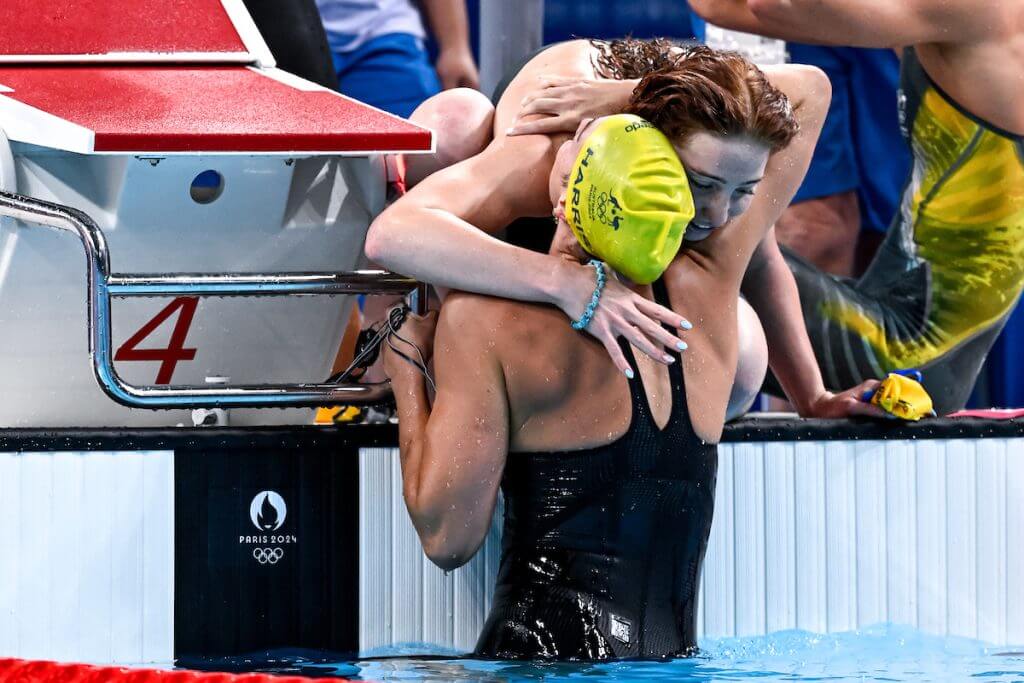Paris Olympics, Day 8 Prelims: Australia Leads Women’s 400 Medley Relay Prelims But Americans Favored in Final

Paris Olympics, Day 8 Prelims: Australia Leads Women’s 400 Medley Relay Prelims But Americans Favored in Final
The Australian women secured the top seed in the women’s 400 medley relay as they aim to defend the title they won in narrow fashion over the United States three years ago, but the U.S. will be lurking in lane six, with both teams bringing entirely new rosters back to race for the medals.
The Aussies clocked 3:54.81 in prelims with a team of Iona Anderson, Ella Ramsay, Alexandra Perkins and Meg Harris, with Perkins clocking 56.59 on butterfly and Harris closing in 52.76. Kaylee McKeown (backstroke), Emma McKeon (butterfly) and Mollie O’Callaghan (freestyle) are the likely additions for the final, while breaststroke will be the questionable leg for Australia.
Australia swam away from China to win the first heat, with China’s team of Wang Xueer, Tang Qianting, Yu Yiting and Wu Qingfeng combining for a mark of 3:56.34. Butterflyer Zhang Yufei and freestyler Yang Junxuan are held in reserve for the final.
- World Record: United States (Smith, King, Dahlia, Manuel) – 3:50.40 (2019)
- Olympic Record: Australia (McKeown, Hodges, McKeon, Campbell) – 3:51.60 (2021)
- Tokyo Olympic Champion: Australia (McKeown, Hodges, McKeon, Campbell) – 3:51.60
In the second heat, Canada held off a charging American team, which ironically featured only two swimmers who raced the respective 100-meter stroke events here and only one who advanced out of prelims, backstroke bronze medalist Katharine Berkoff.
Canada’s Ingrid Wilm, Sophie Angus, Mary-Sophie Harvey and Penny Oleksiak combined for a time of 3:56.10, with Oleksiak anchoring in 52.93. Canada will also make substitutions for the final, with Kylie Masse inserted on backstroke and Maggie Mac Neil on butterfly while Sydney Pickrem (breast) and Summer McIntosh (free) are possibilities.
After Berkoff led off in 58.98, Emma Weber, Alex Shackell and Kate Douglass finished in 3:56.40. Regan Smith and Lilly King are likely to swim the front half in finals, followed by Gretchen Walsh and Torri Huske.
“The goal was just to make it back to finals and we did, so I think we did our job,” said Douglass, who will race in the women’s 200 IM final in the evening session. “I think it’s a nice little warmup for tonight. Me and Regan were talking – she did the relay prelim yesterday – and we think it’s kind of a good warmup for finals.”
Japan, fueled by Mizuki Hirai clocking 56.32 on butterfly, finished just behind the U.S. in 3:56.52, while Sweden finished sixth in 3:57.33. Louise Hansson swam a 56.62 breaststroke split while Sarah Sjostrom cruised a 53.31 freestyle leg.
The home crowd was thrilled when France qualified as the No. 7 seed at 3:57.40 while the Netherlands, anchored by Marrit Steenbergen in 52.40, rounded out the final in 3:57.48.
Composite Relay Analysis
The United States will be the big favorite in the final with a team consisting of three world-record holders: Smith on backstroke, King on breaststroke and Walsh on butterfly. Even though Huske edged Walsh for gold in the 100 fly, the Americans will need Huske on the freestyle, where she is the fastest swimmer by a significant margin, instead of the butterfly, and Walsh did set the Olympic record in the 100 fly semis at 55.38.
Even with McKeown beating Smith in the 100 back and King nowhere near peak form in the 100 breast at this stage of her career, there is essentially no pathway for another country to reach the Americans here. Moreover, the world record that Smith and King spearheaded in 2019 could go down here, with the four women potentially able to swim under 3:50 for the first time.
Consider Australia, returning three swimmers from the squad that beat the U.S. by 0.13 in Tokyo: McKeown could beat Smith, and O’Callaghan could make up ground on Huske on freestyle. McKeon is a superb relay swimmer, her 55.86 fly split in Friday’s mixed medley relay prelims a whopping eight tenths faster than her individual time. But that leaves breaststroke, where no Australian broke 1:07 at this meet, with Jenna Strauch likely Australia’s top option for the final. Even in a disappointing individual performance where she finished fourth here, King clocked 1:05.60.
There is the possibility that Australia dramatically shifts its strategy by moving McKeown to breaststroke and O’Callaghan to backstroke while leaving Harris or inserting Shayna Jack on freestyle. Even if McKeown reaches 1:05-territory (an optimistic perspective), that switch would set Australia back on both backstroke and freestyle, leaving the Dolphins still at least one second back of the American projected time.
China, meanwhile, has Tang standing as the world’s No. 1 breaststroker while Zhang won bronze in the 100 fly and Yang was not far off the medal stand. But backstroke is a huge hole; the best effort this week was Wang’s 59.75 leading off the prelims relay, more than two seconds behind Smith or McKeown. Tang returning to her April time (1:04.39) would close the gap but not enough.
Canada might also work its way into the medal conversation, but with Oleksiak hampered by injuries in recent years and concerns on breaststroke, winning a medal looks unlikely.
Below is the analysis of relays using composite times recorded thus far in Paris. Season-best marks are used for swimmers who did not advance in their respective individual events (Strauch and Angus).
United States: Smith 57.66 + King 1:05.60 + Walsh 55.38 + Huske 52.29 = 3:50.93
Australia: McKeown 57.33 + Strauch 1:06.90 + McKeon 56.74 + O’Callaghan 52.24 = 3:33.21
China: Wang 59.75 + Tang 1:05.54 + Zhang 56.21 + Yang 52.48 = 3:33.98
Canada: Masse 58.29 + Angus 1:06.60 + Mac Neil 56.44 + McIntosh 53.22 = 3:54.55
The American team will leave Paris with a lower-than-usual medal count, but the women’s team has come through with plenty of strong performances across the board, with Huske and Smith as two central stars and Walsh acquitting herself nicely in her first Olympics. This foursome should end a meet that featured plenty of down notes with a feel-good victory.

- EVENT PAGE
- SCHEDULE
- VENUE
- STREAMING INFO
- DAY 1 PRELIMS RESULTS
- DAY 1 FINALS RESULTS
- DAY 2 PRELIMS RESULTS
- DAY 2 FINALS RESULTS
- DAY 3 PRELIMS RESULTS
- DAY 3 FINALS RESULTS
- DAY 4 PRELIMS RESULTS
- DAY 4 FINALS RESULTS
- DAY 5 PRELIMS RESULTS
- DAY 5 FINALS RESULTS
- DAY 6 PRELIMS RESULTS
- DAY 6 FINALS RESULTS
- DAY 7 PRELIMS RESULTS
- DAY 7 FINALS RESULTS
- DAY 8 PRELIMS RESULTS
- DAY 8 FINALS RESULTS
- DAY 9 FINALS RESULTS



